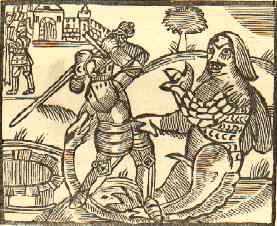More than history
The English victories at Harfleur and Agincourt in Henry V portray Henry as noble and courageous, an image that has stuck. Shakespeare makes Henry a rallying point for English patriotism, as he evokes traditional images of England and englishness in his speech, for example, in his use of St. George.
Agincourt was, however, probably not a very good place to be on St Crispin's day, 1415. The English troops were weary and sick from their long marches and not exactly eager to engage with the French. Shakespeare's version presents the battle in a heroic strain that may represent the disorder of the battle*, but that also exaggerates* the valour and one-sidedness of the victory.
- How accurate is Shakespeare's portrayal of the historical events?
- A musical celebration of the victory.
Footnotes
-
Heroism on stage
Henry says, once the English have carried the day and the French ambassador has come to ask for a stop in the fighting in order to count the dead, "I know not if the day be ours or no" (4.7.76).
-
A hyperbole?
The report given by the messenger of "ten thousand French / That in the field lie slain" (4.8.74) and only thirty dead on the English side is quite exaggerated. There were far more Frenchmen killed that Englishmen, but the victory was not as complete as Shakespeare portrays it.
